Pedigree Dogs Exposed facts for kids
Quick facts for kids Pedigree Dogs Exposed |
|
|---|---|
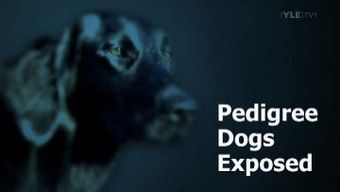 |
|
| Genre | Documentary |
| Narrated by | Jemima Harrison |
| Country of origin | United Kingdom |
| Production | |
| Producer(s) | Jemima Harrison |
| Running time | 60 minutes |
| Production company(s) | Passionate Productions |
| Release | |
| Original network | BBC One |
| Original release | 19 August 2008 |
Pedigree Dogs Exposed is a special TV show from BBC One. It's a documentary that looks into the health and well-being of pedigree dogs (purebred dogs) in the United Kingdom. The show first aired on August 19, 2008.
The program pointed out problems with The Kennel Club (KC), which is the main group for pedigree dogs in the UK. The Kennel Club also runs the famous dog show called Crufts. The show suggested that the way dogs were judged and bred by the Kennel Club might be causing health issues for the dogs.
After the show aired, many people criticized the Kennel Club. Some companies that sponsored Crufts and other Kennel Club events decided to stop their support. The BBC, which had shown Crufts for 42 years, decided not to broadcast the show in 2009 or in the future.
At first, the Kennel Club disagreed with the show's claims that many dogs were sick. They said most purebred dogs were healthy. But because of strong public reaction, they later started new health plans and looked at the standards for every dog breed. Some dog breeders thought the Kennel Club was overreacting. A follow-up show, Pedigree Dogs Exposed: Three Years On, was broadcast in 2012.
Contents
Dog Health Concerns
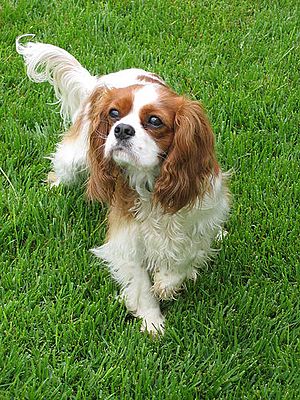
The documentary showed a Cavalier King Charles Spaniel suffering from a painful condition called syringomyelia. This happens when the dog's skull is too small for its brain. A vet expert, Dr. Claire Rusbridge, compared it to trying to fit a "size 10-foot into a size 6 shoe." She thought that about one-third of this breed might have this problem. Another common issue for Cavaliers is heart disease. A heart doctor, Simon Swift, explained that about half of all Cavaliers aged 5 have heart murmurs, and almost all of them have it by age 10 or 11.
The show said that about three-quarters of the 7 million dogs in the UK are pedigree breeds. These dogs need about £10 million worth of vet care every week. A top scientist, Steve Jones, said that a big reason for these problems is inbreeding, which is when closely related dogs are bred together. The chief vet for the RSPCA, Mark Evans, blamed competitive dog shows for making the problem worse.
How Breeds Have Changed
The program showed old pictures of breeds like the Dachshund, Basset Hound, Bull Terrier, Bulldog, Pug, and German Shepherd Dog. These pictures showed how much these dogs have changed over the last 100 years. For example, the German Shepherd Dog seen in dog shows today looks very different from the working German Shepherd Dogs, which still look like the older versions.
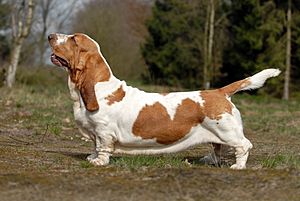
A judge for Crufts, Terry Hannan, said that working German Shepherds are not built correctly and that the show dogs are the ones that meet the breed standards. When the head of the Basset Hound Club was asked if they were breeding "deformed congenital dwarfs," he disagreed. He said that today's Basset Hounds look like those from the 1800s, but he wasn't happy when shown a picture of a Basset Hound from 60 years ago.
Bulldog breeders often say that their dogs' extreme features, like a very short nose and wrinkled faces, were for historical fighting purposes. But historian David Hancock said this wasn't true. The show explained that Bulldog heads have become so large that most puppies have to be born by C-section (a surgery).
The Boxer breed was also mentioned for having heart diseases and a high risk of cancer. The show even featured a Boxer having an epileptic seizure.
The program explained that dogs were first bred for jobs like hunting or guarding. But in the mid-1800s, owning certain dogs became a sign of wealth, and dog breeding became a sport. This meant that how a dog looked became more important than how well it could do its job. RSPCA Chief Vet Mark Evans called the Crufts show "a parade of mutants" and a "freakish beauty pageant" that had nothing to do with health.
Breeding for Appearance
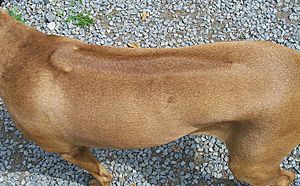
The show discussed how some purebred dog breeding practices are based on choosing dogs for specific looks. For example, a Rhodesian Ridgeback breeder said that healthy puppies born without the breed's special ridge should be "culled." Culling in this case means preventing them from being bred, often by neutering them, not necessarily killing them. The head of the Rhodesian Ridgeback Club said she saw ridgelessness as a genetic flaw. The ridge is a genetic trait that can make dogs more likely to have a condition called dermoid sinus.
When asked about preventing healthy puppies from breeding for cosmetic reasons, Kennel Club chairman Ronnie Irving said he didn't know about such practices and that they were not acceptable. The show revealed that after the interview, the Kennel Club told the Rhodesian Ridgeback Club to change their rules. The breed club said the Kennel Club already knew about their rules because they had to approve them every year.
Other examples of preventing dogs from breeding for cosmetic reasons included Great Danes with unusual markings, white German Shepherds, and white Boxers. The show also pointed out that purebred dogs, chosen for specific looks, were often less healthy than mongrels (mixed-breed dogs).
Inbreeding Problems
The show explained that breeding very closely related dogs, like mother-to-son or brother-to-sister, can cause serious genetic diseases to spread in many breeds. A report in 2006 said that inbreeding needed to be controlled and that dogs with genetic problems should not be allowed in dog shows. Mr. Irving from the Kennel Club disagreed, saying the report was based on feelings, not science.
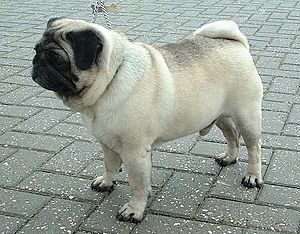
However, a 2004 paper by the Kennel Club's own geneticist, Jeff Sampson, said that "inherited diseases are imposing a serious disease burden on many, if not all, breeds of dogs." Yet, when interviewed, Sampson said that "the vast majority of dogs we register will live long, happy, and healthy lives." A study found that the 10,000 Pugs in the UK are so inbred that their genetic variety is like having only 50 different dogs. This means they have a very small "gene pool."
Health Testing and Champions
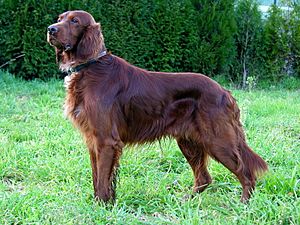
The program showed that out of over 200 breeds registered by the Kennel Club, only two breeds, the Irish Setter and the Irish Red and White Setter, have required health tests. The Kennel Club said that requiring too many tests might make breeders leave the club.
The show also pointed out that there isn't a good system to record inherited diseases. Any health checks that exist are "often not good enough or don't work well." For Cavalier King Charles Spaniels, responsible breeders have used heart screening tests since 1995. But because many breeders don't follow advice to only breed older dogs, there hasn't been much improvement in heart health for the breed.
The program showed examples of dogs with serious inherited diseases winning dog show championships. These dogs were still allowed to be bred, and some passed on their diseases to their puppies.
For instance, the 2003 Crufts champion, a Pekingese, had to sit on an ice pack for its photo. The show explained that this breed often gets too hot because its flat face makes it hard to breathe. This dog had even had surgery to help it breathe better. A vet expert, Professor Dan Brockman, said this condition is inherited and likely to be passed down. Despite this, the champion dog had fathered 18 litters of puppies.
The program ended with RSPCA Chief Vet Mark Evans asking for a "complete top-to-bottom review of breed standards" and dog show rules. He wanted to move dog showing away from focusing only on beauty and more towards the dogs' quality of life.
Show's Impact
The documentary, which took two years to make, was watched by 3.9 million people.
Before the show aired, the Kennel Club warned that it might be unfair. After it aired, they said the show was "sensational" and complained to the broadcasting regulator, Ofcom, claiming "unfair treatment." The BBC, however, stood by its reporting.
The Rhodesian Ridgeback Club disagreed with the show's claim that the ridge "serves no purpose." They said the ridge helps define their breed. Regarding their rule that "Ridgeless puppies shall be culled at birth," the club pointed out that the rule also said, "if a breeder finds this morally impossible the puppy shall be homed." They have since changed their rule to say "no healthy puppy will be culled."
The RSPCA stated that it was "concerned about the unacceptably high levels of disability, deformity and disease affecting pedigree dogs."
Ronnie Irving, the Kennel Club Chairman, said that the show should teach "purists" in some breeds that "some old attitudes are simply no longer sustainable." He believed most dogs were healthy but urged breeders to avoid exaggerations.
Dogs Today editor Beverley Cuddy, who said in the show that "dogs are falling apart," disagreed with the Kennel Club's claim that 90% of dogs are healthy. She pointed to a survey that showed 37.4% of dogs had at least one serious health issue by age 5.
Sponsorship Changes
After the show, the BBC considered ending its long relationship with Crufts. Various sponsors, including the Royal Society for the Prevention of Cruelty to Animals, the People's Dispensary for Sick Animals, and Dogs Trust, stopped supporting the show. On October 24, Pedigree Petfoods, a main sponsor for 44 years, also withdrew its sponsorship.
On December 12, the BBC decided not to broadcast Crufts 2009. They couldn't agree with the Kennel Club's request to remove 12 "at-risk" breeds from the main event.
New Breed Standards
On October 7, 2008, the Kennel Club announced new health plans. They started reviewing breed standards for every breed and said that show judges would need to consider health when judging. They also asked the government for powers to take action against breeders who don't follow health standards. Some breed clubs, like the Bulldog breed council, disagreed with the new standards, saying they wouldn't improve the breed's health.
On January 12, the Kennel Club released its updated breed standards. These new rules would "not include anything that could in any way be interpreted as encouraging features that might prevent a dog from breathing, walking and seeing freely." This aims to stop breeders from making features like short muzzles or loose skin too extreme, which can harm a dog's health. Rules to ban very close inbreeding (parent/child and sibling/sibling) started on March 1, 2009. Judges were also given the power to remove unhealthy dogs from competitions.
Jemima Harrison, the producer of Pedigree Dogs Exposed, said the changes were "long overdue." RSPCA chief vet Mark Evans welcomed the ban on close inbreeding but felt the breed standard changes were not "radical enough."
Official Complaints
Ofcom, the broadcasting regulator, released its findings on December 9. Most of the Kennel Club's complaints were dismissed. However, Ofcom agreed that the Kennel Club wasn't given a chance to respond to some claims, especially those about "eugenics" (a complex idea about selective breeding) and an implied cover-up about the Crufts champion's surgery. Two complaints from the Rhodesian Ridgeback Club were also upheld: that research on dermoid sinus was unfairly shown, and that the ridge was wrongly called a deformity or a mild form of spina bifida.
Reports and Recommendations
RSPCA Report
In February 2009, a scientific report ordered by the RSPCA said that "exaggerated physical features and inherited diseases cause serious welfare problems in pedigree dogs." The report stated that "breeding practices and efforts by breed societies and kennel clubs... have been ineffective at protecting the welfare of many breeds of domestic dog." It called for urgent changes in breeding and selection. The Kennel Club said the report didn't recognize the progress already made in dog health.
APGAW Inquiry
The Associate Parliamentary Group for Animal Welfare (APGAW) released its report in November. It highlighted "serious problems with the health and welfare of many pedigree dogs" caused by current breeding practices. It suggested that breed standards should focus less on looks and more on whether dogs are "fit for purpose" (healthy and able to do what they were bred for). It also recommended that health tests should be strongly encouraged.
The report also said that the Kennel Club should decide if its main goal is registering dogs or ensuring dog health and welfare. It warned that if the health measures taken by the Kennel Club failed, government rules might be needed.
Bateson Report
A detailed independent study on dog breeding, led by Sir Patrick Bateson and supported by the Kennel Club and Dogs Trust, was released in January 2010.
The report found that breeding for specific looks has changed many well-known breeds over the last 50 to 100 years, often making them less healthy. It said that "selection for specific characteristics written in breed standards can be demonstrated to be directly threatening to health and welfare."
The report suggested that dog shows and judging could be a powerful way to improve dog welfare. It recommended that breed standards should be changed to avoid choosing extreme features that harm a dog's health.
It also explained that too much inbreeding happens because of small starting populations of dogs and the deliberate use of inbreeding to get desired traits. While inbreeding can sometimes remove bad traits, it can also cause hidden bad traits to appear and reduce a dog's overall health. The report advised against grandparent/grandchildren matings, in addition to the already banned parent/child and sibling/sibling matings.
The report suggested creating a new Advisory Council on Dog Breeding because it's hard for the Kennel Club to be both the rule-maker and the enforcer when dealing with breeders who have strong opinions. It also called for a "rigorous, robustly policed and well-respected" quality assurance scheme to help buyers find good breeders.
The Kennel Club welcomed the report's focus on irresponsible breeders and its suggestions for changing how the public thinks about buying dogs.
International Broadcast
In Australia, the show Pedigree Dogs Exposed was shown on ABC1 on September 10, 2009. It caused a similar reaction from the public, breeders, and media as it did in the UK.
|
See also
 In Spanish: Los secretos del pedigrí para niños
In Spanish: Los secretos del pedigrí para niños
 | Charles R. Drew |
 | Benjamin Banneker |
 | Jane C. Wright |
 | Roger Arliner Young |

